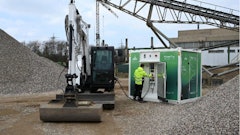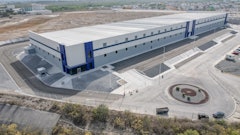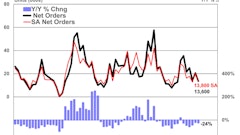Every year about this time, a lot of companies and business leaders are completing their projections for 2007. You should be doing the same, especially this year when the industry cycle "stars" are swirling in the sky.
When we talk about projections, we're not just talking about the one-line summarized income statement you jotted down while watching the playoff games. We're referring to honest-to-goodness full projections that project profit and loss, balance sheets and cash flow. This is not as easy to do as the summarized income statement. But it is certainly a better management tool to plan your year, and it's a great indicator of how to make changes when necessary.
Keep in mind one thing: Sales have nothing to do with cash flow. You can easily sell yourself into bankruptcy. Don't take my word for it. Just put together the projections as noted above, and for one scenario, jack up the sales by 40% and see if you have enough working capital to pay your bills. Chances are you don't because every dollar of sales normally requires some amount of permanent capital to support those sales and fund the working capital needs you have created.
Many of you are thinking, "So what? I can just borrow what I need." In many cases, that will be possible, but remember that you have borrowing limits. Sooner or later - because you keep racking up billing requirements faster than you collect - you will exceed those borrowing limits when you can least afford to do so. It happens to businesses every day.
Find the right financial tools
Don't worry, there are resources available to help you create the necessary financial tools. Many of them are pretty user friendly, and as a manager or CEO of your company, it really is not a bad idea to try to do this yourself. It will teach you a lot about your industry and business. Your accountant may even have a program you can use so you can get it started. Then, if you need help, get him/her to look it over with you.
You may also want to check with your system provider to see if there is a cash flow module you can add to the system. However, I would check the stand-alones, as well, since they may produce a similar product for less cost.
Whichever cash flow model you choose, it has to be user friendly and allow "what-if" scenarios. One program I work with, called Up Your Cash Flow (Granville Publications Software), supplies balance sheets, income statements and cash flows. You can check their web site (www.cashplan.com) if you want more information.
Get control of cash flow
On the simple side of things, you can protect your cash flow by staying on top of receivables. This is easy to do if you have proper credit policies in place; you bill as soon as you can; and you have a collection program implemented to bring the money in.
But, let's face it - this is tough to do in the contracting business because money can get held up for a lot of reasons outside your control. That does not mean, however, that you can ignore cash control for the rest of your business. You can't.
Every business needs controls. Every business runs on cash. Every business owner owes it to him/herself to know what the company's cash position is and what it could be depending on various variables. Those variables can each be used in a cash flow model to see what affect they have on cash flow. A review of the various scenarios will put you in control of your business and assist with the final formation of the business plan for 2007.
In 2007, the construction business could prove tough, depending on the type of business you have and the specific industry you are in. The housing slowdown is sure to be detrimental for some, yet prove meaningless for others. If you fall in the former category, budgets and cash flow models are a must if you want to maximize cash. And who's kidding who - I can't think of anyone who doesn't want to do that.???
Garry Bartecki is director of dealer/distributor services at BDO Seidman, LLP of Chicago, as well as a consultant to the AED. He has also worked as an independent CPA and consultant to equipment dealers. He can be reached at (312) 616-4677 or [email protected].


























